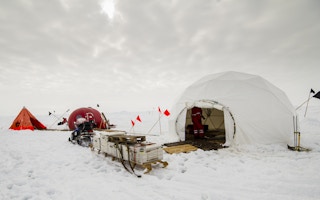The world today is experiencing more of the devastating effects of global warming.
The rising temperature has triggered many natural disasters such as floods, forest fires and the rise in sea level, raising deep anxiety worldwide.
Although there is an increase of only a two-degree Celsius in the earth’s temperature between 1950 and 2000, it is enough to adversely impact the Arctic’s in the North Pole and Antarctica in the South Pole. It has caused the ice in Greenland, the Arctic Sea and the Antarctica continent to melt.
According to the World Meteorological Organisation (WMO) annual report, the occurrence of serious droughts, heat wave, flood and tropical storms last year were caused by the change in global climate. This has resulted in the destruction or loss of human and animal lives as well as property.
The report also showed that the year 2013 showed a similar trend to 2007 in terms of the increase of atmospheric temperature, sea temperature, sea level and greenhouse gases as well as extreme weather conditions.
The mission to Antarctica
Researchers from around the world would travel Antarctica to study the effects of global climate change. The continent is situated in the southern hemisphere and regarded an open laboratory to all.
Antarctica is the coldest, driest and windiest continent in the world and 98 percent covered in ice that can go as cold as -89 degrees Celsius.
If all the ice blocks there were to melt, it is believed that the world’s sea water level would rise between 60 and 65m.
Nearly 5,000 researchers from all over the world come to Antarctica every year to explore the mysteries of the continent.
Malaysia, through the Sultan Zainal Abidin Antarctica Research Foundation established in 2013, also actively sends its researchers there.
Next January, eight researchers will follow an expedition to Antarctica under the foundation to study the effects of global climate change on human lives, particularly in Malaysia.
The team, headed by Dr Mohamed Huzaimy Jusoh from Universiti Teknologi Mara (UiTM), will leave for Antarctica on Jan 13 for their 22-day trip.
The other seven areDr Mohd Shahrul Mohd Nadzir and Dr Goh Thian Lai from Universiti Kebangsaan Malaysia (UKM), Dr Foong Swee Yoek and Muhammad Hilal Mohd Zainudin from Universiti Sains Malaysia (USM), Dr Wan Mohd Rauhan Wan Hussin from Universiti Malaysia Terengganu, Dr Emienour Muzlina from Universiti Malaya and Aniqah Zulfa Abdul Latif from the International Medical University.
They will be covering an array of research topics ranging from electrical engineering to atmospheric science.
They will be transiting in Buenos Aires, Argentina before sailing to Antarctica on Jan 18 on a chartered sailboat, said the foundation’s CEO Mohd Nasarudin Abd Rahman.
The research foundation
Since the establishment of the foundation, six researchers have been awarded grants to study climate change in Antarctica. Each grant is worth RM150,000 for three years of research.
Mohd Nasarudin said five researchers were awarded the grant in this year’s expedition, while the rest were sponsored by their respective universities.
In the bid to provide more researchers the opportunity to conduct their research in Antarctica, the foundation has partnered with developed nations with bases in the continent.
“The foundation has signed a collaboration with Britain for five years until 2018 to bring Malaysian researchers into Antarctica subject to the quota set by them.
“However, next year’s expedition will be the first independent one for Malaysian researchers going into Antarctica,” he said.
It costs every researcher RM37,500 to charter the sailboat throughout their trip.
They would be sailing no less than 500km by focusing on the Antarctic peninsula to get study samples.
“Antarctica is twice the size of Australia, so it is of course impossible to cover the entire area in 22 days.
“They will only stop at nine stations to get the sample needed,” he said.
The stations are in Ushuaia, King George Island, Greenwish Island, Deception Island, Davis Coast, Danco Coast, Graham/ Loubet Coast, Adelaide Island and Barry Island.
Studying the effects of greenhouse gases
UKM lecturer Mohd Shahrul would be using the portable Gas Chromatograph (GC) to obtain samples of the greenhouse gases released in Antarctica and compare with those released in Malaysia.
The joint research between UKM and the University of Cambridge, UK saw the GC, specially designed by Dr Andrew Robinson of the latter university using in the greenhouse gases research done in Malaysia since 2006.
The machine was placed in five locations worldwide: two in Kelantan and Sabah and three in Taiwan, Australia and New Zealand.
Mohd Shahrul, whom the foundation awarded a grant last year, is focusing his research on how greenhouses gases affect global climate due to its ozone-thinning effects.
Arctic ozone holes found in 1972 made the continent one of the most importation locations for the study of the atmosphere’s ozone layers.
The thinning ozone causes ultraviolet rays to penetrate through to earth and melt the ice in the Antarctic, eventually leading to a rise in sea level, he said.
If radical climate change continue to take place for the next 10 to 20 years, it was not impossible that it would drown smaller areas in the lowlands like the Maldive Islands.
“This is important information because Malaysia is a tropical country. According to scientific research done by foreign scientists, tropical areas are the main gateway for reactive gases into the atmospheric layer. It would subsequently contribute to the rise of temperature in the European region, Asia and even the Antarctic,” said Mohd Shahrul, who is also the head of the Tropical Climate Change Sysem Centre at the Institute of Climate Change in UKM.
This is due to several factors such as the monsoon winds, the year-long hot and humid weather causes the convection process of active gases to quickly reach the atmosphere.
This uniqueness has many researchers from renowned universities like the University of Cambridge and Oxford coming down to Malaysia to conduct research on the subject.

















